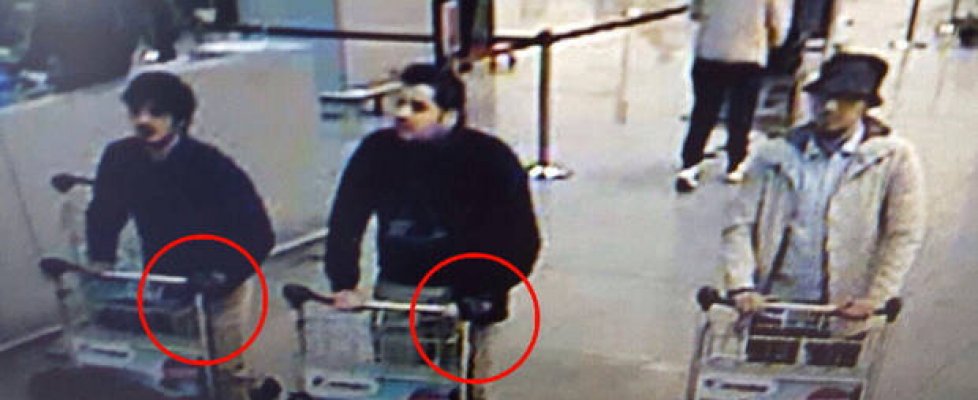Interview
Terror expert: ‘Belgium underestimated Salah’s network’
The director of terrorism at the Institute for International Political Studies says, “We are not talking about a small cell, but something more.”

We asked Arturo Varvelli, head of the terrorism program at the Institute for International Political Studies, for his opinion on Tuesday’s attacks in Brussels. Coming right on the heels of the arrest of Salah Abdeslam, the sole surviving suspect in the Paris attacks, how could intelligence have missed the latest plot? To Varvelli, it shows that there’s been a breakdown in the authorities’ communication and in their understanding of the size of their enemy.
You are in Brussels now. Can you tell us what the atmosphere is like in the Belgian capital?
The mood is as you can imagine. This morning the city was deserted. There were few people around. … The faces of people look bewildered. We have seen people in tears outside the subway where the attacks were carried out, people who told us to go back.
Let’s talk about the attacks. After Paris, it was said that the French police had knowledge of plans, but apparently failed to act in time. How was it possible that the Belgian intelligence, engaged in a massive way, especially after the arrest of Salah, has been unable to prevent this kind of attack?
Of course what happened in Brussels simply tells us that the network of possible attackers, sympathizers or supporters is very extended. We had already understood this because someone like Salah could blend in town for four months. Therefore, we are not talking about a small cell, but something more. Furthermore, we need to take into account the number of foreign fighters from Belgium who have joined the fight, another symptom of a partially failed integration system, even though a large part of the community is integrated.
And who is not integrated?
Part of this community lives in a conspiracy of silence, that can either mean sympathy or sometimes fear of retaliation for tipping off the authorities. These are issues which must be taken into account. Then we have to add that the security system in Belgium, as had already happened with France, was hit again. We can go back to the discussion of preventive security: the need, in theory, for greater coordination among intelligence services. And we should think about what the Islamic State is and what it represents for the Sunni population in the Muslim world.
Does this have something to do with ISIS propaganda and the Western response?
The picture is clear: The Sunnis have felt excluded, and this of course does not justify any act of terrorism, but let us ask ourselves, what motivates the Islamic State? ISIS’s foundation is the desire to create factions and divisions and give the Sunni population a sense of redemption. The caliphate is defined as terrible by the Western media, but for those who leave, it is a kind of Promised Land, an El Dorado in which they can live. The caliphate does not speak in nuances; there are no gray areas. The terrorist system they have created is above all political communication, propaganda, with which they delete the nuances. Everything becomes black and white. The problem is that we have fallen into this trap as well, because they want to make us feel at war, but it is a false description.
But we almost always answer with weapons.
We have to be civil, always. This means that when you take into account an armed response, you must know and evaluate the consequences very carefully. And we saw that in the last times, these armed interventions have turned against us and beyond. The failure of states in the Middle East can be considered in part inherent in the path of the Islamic world, but is also due to failed armed intervention. Iraq, Libya and Syria are there to prove it. Where the states have crumbled, radical Islamist groups have taken over who have, so to speak, “climbed” those states. When we act, the strategic objective must be to create inclusive governments that can be guided to stand on their own feet — pluralistic societies. It does not mean exporting democracy with bayonets, as was done in the past, neither does not mean to help the consolidation of authoritarian states. The ability of our society to create inclusive situations applies not only to the Middle East, but also to Europe.
Returning to the attack, security in Belgium showed the difficulty to predict certain attacks.
This flaw is disturbing, but if we look at the number of Belgian nationals involved, because they are Belgian citizens, it is really difficult to understand how best to curb this phenomenon. The network was definitely underestimated, and the security forces of Belgium were not prepared. … They have made errors of judgment, and there are many difficulties linked to social and inter-coordination issues. The security services, quite rightly, are possessive of their own information, but you have to make an effort of integration, by force of circumstances.
And all of this now, when the E.U. appears to be falling apart.
We risk heading for — without wanting to accuse anyone — phenomena we already know. History teaches us that in the rush to answer to citizen-voters, politicians often act belligerently and then the response can be very violent. As Bush did, after Sept. 11, reacting in a counterproductive way, going too far.
Originally published at http://ilmanifesto.info/sottostimata-lampia-rete-di-connivenza-di-salah/ on 2016-03-23
